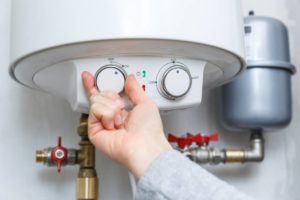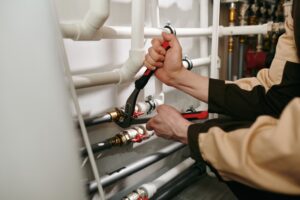 Between freezing weather and holiday festivities, the winter months can take a serious toll on your water heater. To ensure you have plenty of hot water all throughout the cold season, it’s important to prepare your water heater for winter as soon as temperatures begin to drop. Fortunately, seasonal maintenance doesn’t have to be difficult or expensive. Here are the top ways to get your water heater ready for winter weather:
Between freezing weather and holiday festivities, the winter months can take a serious toll on your water heater. To ensure you have plenty of hot water all throughout the cold season, it’s important to prepare your water heater for winter as soon as temperatures begin to drop. Fortunately, seasonal maintenance doesn’t have to be difficult or expensive. Here are the top ways to get your water heater ready for winter weather:
Flush the Tank
Professionals recommend that homeowners flush their water heaters at least once per year to clear out any sediment that is building up inside of the tank. Since your water heater has to work harder in the winter to maintain warm temperatures, fall is the best time of year to empty and clean out your tank. To flush your water heater, follow these general steps:
- Turn off the power source
- Give the tank time to cool down
- Close the water supply valve
- Attach a hose to the drain valve
- Open the drain valve and drain the water
- Test the water quality for signs of sediment
- Close the drain valve and refill the tank
If you aren’t sure how to flush your tank or have questions about the process, reach out to the experts at D&F Plumbing, Heating and Cooling! Our licensed team has years of experience working on a variety of water heater types, so they can make the process quick and easy.
Insulate Pipes
Insulating exposed pipes near your water heater helps increase efficiency and keeps your hot water from freezing during cold spells. You may also want to consider insulating pipes in areas that are particularly drafty or cold, such as basements and attics. This will help keep them warm and prevent potential burst pipe damage due to freezing temperatures.
Lower the Temperature
Cold weather places a lot of strain on your water heater by making it difficult to retain thermal energy. To keep your unit from working in overdrive, we recommend dialing back the heat just a little bit during the winter. If you normally keep your unit at 140 degrees Fahrenheit in the summer, consider lowering the temperature to 120 degrees Fahrenheit. Doing so will not only prevent malfunctions, but it will also lower your utility bills significantly by reducing heat loss through the tank.
Check for Leaks or Corrosion
Leaking and corrosion are surefire signs that your water heater needs to be repaired or replaced. Look near your unit for puddles of water, dripping, or other moisture problems. Also, it’s prudent to pull out the anode rod to check for corrosion. If you notice any damage, contact a licensed plumber to inspect the water heater.
Schedule a Professional Inspection
If you want peace of mind knowing that your water heater is in great shape for the winter, schedule a professional maintenance service! At D&F Plumbing, Heating and Cooling, our licensed experts are committed to providing you with excellent service and durable results. We are very familiar with common water heater problems, so we will provide you with recommendations on how to keep your unit functioning perfectly long-term. For a free estimate, get in touch with us today!




